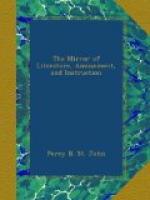The Arabs place still more value on their mares than on their horses; but even the latter are sometimes esteemed beyond all price. When the envoy, returning from his former mission, was encamped near Bagdad, an Arab rode a bright bay horse of extraordinary shape and beauty, before his tent, till he attracted his notice. On being asked if he would sell him—“What will you give me?” said he. “It depends upon his age; I suppose he is past five?” “Guess again,” was the reply. “Four.” “Look at his mouth,” said the Arab, with a smile. On examination he was found rising three; this, from his size and perfect symmetry, greatly enhanced his value. The envoy said, “I will give you fifty tomans[3].” “A little more, if you please,” said the fellow, apparently entertained. “Eighty!—a hundred!” He shook his head, and smiled. The offer came at last to two hundred tomans! “Well,” said the Arab, seemingly quite satisfied, “you need not tempt me any farther—it is of no use; you are a fine elchee; you have fine horses, camels, and mules, and I am told you have loads of silver and gold: now,” added he, “you want my colt, but you shall not have him for all you have got.” So saying, he rode off to the desert, whence he had come, and where he, no doubt, amused his brethren with an account of what had passed between him and the European envoy.
[3] A toman is a nominal coin
nearly the value of a pound
sterling.
* * * * *
PARIS.
Paris is, as it were, abandoned to foreign travellers in September and October. It is not till the first symptoms of cold are felt somewhat severely, that life in the capital is resumed in all its tumult. The Paris season is the reverse of that of London. It commences at the end of November, and closes at the beginning of May. The period of your hunting is that of our drawing-room parties. Previous to November, Paris may be compared to a vast lazaretto, where the valetudinarians of every country take refuge.—Monthly Magazine
* * * * *
MUSICIAN OF MANDARA.
[Illustration: Musician blowing a long pipe]
The above engraving represents one of the musicians of the Sultan of Mandara; blowing a long pipe not unlike a clarionet, ornamented with shells. These artists, with two immense trumpets from twelve to fourteen feet long, borne by men on horseback, made of pieces of hollow wood with a brass mouth-piece, usually precede the sovereign on any important visit. The costume and attitude of the musician are highly characteristic of savage mirth.
The chiefs in this part of Africa are also attended by a band carrying drums, and singing extempore songs, a translation of one of which is subjoined from “Denham’s Travels,” whence the engraving is copied.
Christian man he come,
Friend of us and Sheikhobe;
White man, when he hear my song,
Fine new tobe give me.




